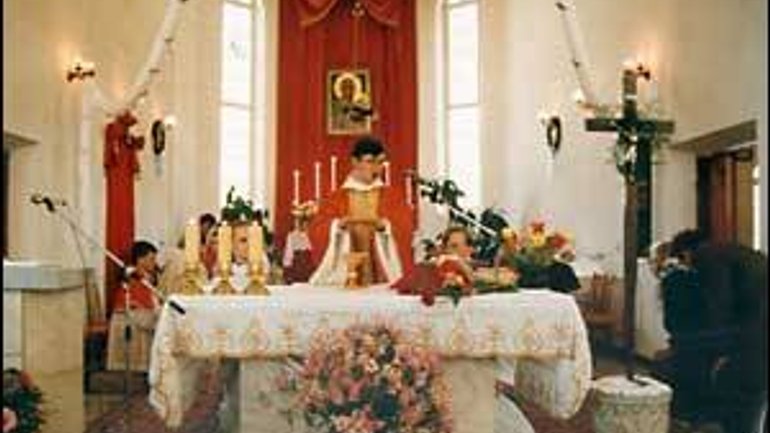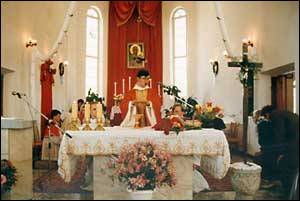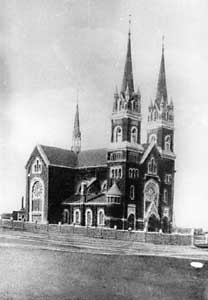Roman Catholics were among the founders of Odesa

In a former church building in Balkivska Street in Odesa, the Roman Catholic Monastery of the Pallotine Fathers is located. A huge amount of work has been done since its foundation, and, most importantly, religious services have resumed in the small Church of St. Clement, attached to the monastery. The abbot of the monastery, Fr. Anatolii, gave an interview to RISU.
Tell us about the history of the monastery: The Pallotine Fathers first came to this monastery in 1994. This is the place where our fellow brother Stanislaw Szulminski was born and lived. He gave his life for the faith and was sent into exile to Siberia.
 Our objective was to return to the foundations laid by Stanislaw Szulminski. Moreover, he is a candidate for canonization, a candidate for the honors of the altar. Besides, Ukraine is the very place where the Pallotine Fathers' roots are found. Our desire is to revive Christian awareness in Odesa, to make sure our future becomes another page added to history. For it appears that they do not know enough about Catholics in Odesa today.
Our objective was to return to the foundations laid by Stanislaw Szulminski. Moreover, he is a candidate for canonization, a candidate for the honors of the altar. Besides, Ukraine is the very place where the Pallotine Fathers' roots are found. Our desire is to revive Christian awareness in Odesa, to make sure our future becomes another page added to history. For it appears that they do not know enough about Catholics in Odesa today.
The area in Odesa where your monastery is located was Catholic at one time.
Catholics lived in Odesa from the time of its foundation. One can mention the first governor, Duke Richelieu; another outstanding man, Mr. Langeron, who is buried in our cathedral.
We can see from history that the majority of Odesa architects were Catholics. The architecture of the city's Orthodox churches cannot be defined as purely Slavic. It was influenced by Roman, as well as Byzantine architecture.
According to a historical source, in 1913 our three parishes (the cathedral, St. Peter's Church and St. Clement's Church) had many thousands of faithful. As I recall, St. Clement's parish was the largest and it had 17,000 faithful; the cathedral had 15,000 and St. Peter's had 10,000.
The three church buildings were centers for three ethnic parishes. St. Clement's was mostly attended by Poles, who built a railway here. Germans went to the cathedral on Katerynynska Street, and the congregation of St. Peter's was predominantly French and Italian.
Does the Roman Catholic Church intend to restore St. Clement's Church, destroyed by the communist regime?
 We would like to concentrate mostly on spiritual revival. We can restore the buildings in quite a short time, but it is much more difficult to gather people around the church.
We would like to concentrate mostly on spiritual revival. We can restore the buildings in quite a short time, but it is much more difficult to gather people around the church.
Our primary goal is to revive our faithful's awareness of being Catholic Christians who confess and practice the 10 commandments.
People should go to church not because it is fashionable or because their parents were Catholics, but to come to know the Living God.
What might be of special interest to a resident of Odesa or pilgrim visiting your monastery?
The main objective of our order is the formation of the laity. And that is why we are in this building. Practically from the very beginning small Bible study and prayer groups have existed at our parish. In addition to participating in services, they meet every Sunday to discuss holy Scripture.
We plan to open a two-year training school for persons who would like to become family cathechists.
We have people who have graduated from higher educational establishments in Poland and Italy, and who would like to follow their calling in Ukraine and, in particular, in Odesa.
In February 2003, a joint prayer meeting of clergy from various churches was held in St. Clement's Church, attached to the monastery. The bishops and pastors prayed for unity among Christians. Are these prayers to continue?
Perhaps, if the Lord permits, we will continue the joint prayers. Though we represent different confessions, we believe in one God. the Holy Trinity.
Setting up the spiritual council of various churches in Odesa is the result of the joint prayer service. There is no legal basis for this council, but we can use it to organize joint activities and to help each other.
(interview conducted on 7 March 2003 in Odesa)
Photos:
- The abbot of the monastery, Father Anatolii, during a service
- A view of St. Clement's Church, destroyed by the communist regime in the late 1930s









